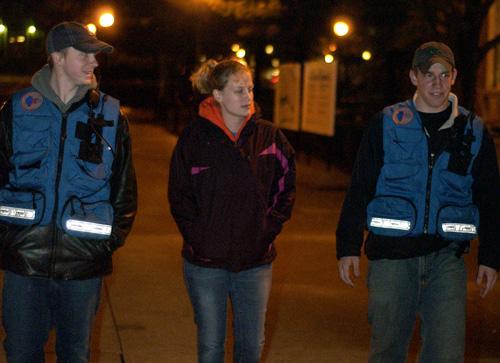Students not calling Safe Walks

Sophomore Jeremiah Allen, left, and junior Jon Manko, right, student patrol officers for Safe Walks, accompany a student who wished not to be named back to her apartment on Tuesday around 11:30 p.m. Erica Magda
Apr 10, 2008
Last updated on May 13, 2016 at 09:34 a.m.
A Code 1 Emergency alerts every police officer in the area to respond to a site with flashing lights.
Unfortunately, there is no Code 1 for students who neglect their own safety.
Despite promising a safety-ensured escort back home, Safe Walks, a service provided by student patrol officers, remains underused.
“Many students will see us and automatically assume that we will give them a ticket,” said Jarred Logan, sophomore in aviation and one of three team leaders for the University student patrol. “(Students) will shy away from us and not even take advantage of the service that we can provide.”
Get The Daily Illini in your inbox!
Safe Walks is an on-foot version of Safe Rides. A team of two student patrol officers escort students wary of walking to their residences alone. Whether due to lack of concern for their own safety, fear of law enforcement or ignorance of Safe Walks, few students use the service.
“We can’t force anybody to (use Safe Walks),” said Officer Nate Park, student patrol coordinator. “Even as a police officer, when I’m driving around and patrolling, I see people walking around by themselves in dark areas.”
Park said students request Safe Walks for as short as a block to as long as a mile.
Although Park said safety issues prevent student patrol officers from venturing too close to the bars, the escorts establish nearby meeting points.
Garrett Leffelman, junior in aviation and one of three team leaders for student patrol, said the response time from a student calling Safe Walks to the patrol escorts’ response can be as short as five minutes.
Logan said student patrol officers sport blue vests to deter threats and promote student well-being without the menace of a drinking ticket.
“Our vests will scare away will-be muggers or bad people, so to speak,” Logan said. The patrol officers also have a radio that hears everything police are dispatching in Champaign and Urbana.
While most of campus is indifferent to student patrol services, some students are hostile toward them.
“Some people just do not have that friendly feeling with anything to do with law enforcement,” Logan said. “It is the students that have done something wrong or are friends of someone that has been punished for doing something wrong who will harbor negative feelings toward officers.”
Indifferent or negative biases toward law enforcement officials overshadow the benefits of Safe Walks.
“When we do get heckled, it’s just water off of a duck’s back because we know that they do not know any better,” Logan said. “They are usually intoxicated and think they would be funny.”
Students need not fear a drinking ticket from a student patrol officer.
“If they come and ask us for a safe walk back, and they’re underage and drunk, we really don’t have the authority to (write a ticket),” said Leffelman, who has been on student patrol for five semesters. “Our responsibility is to get them home.”
Logan added that student patrol officers will radio police help if heavily intoxicated students are in danger of injuring themselves or others.
Park said the amount of students who use Safe Walks correlates with the public perception of how safe the campus is.
Mass emergency e-mails that inform the campus of sexual assaults or robberies prompt a spike in students using Safe Walks.
“When (public safety) is at a norm, the amount of Safe Walks calls goes down dramatically,” he said.
Ninety percent of students requesting Safe Walks are females, the majority of whom are alone.
Surprisingly, the number of Safe Walks calls stayed the same following the NIU shootings.
The University Police are looking into posting fliers in dorms, the Union or other University buildings to advertise Safe Walks.
“I can guarantee that the majority of (students) don’t even know what Safe Walks is,” Park said.
Leffelman estimated that up to three-fourths of Safe Walks calls are from repeat customers or students who have used the service in the past. Logan said new customers do not use Safe Walks because they do not investigate what it is.
“We are not there to bust people,” Logan said. “We are there to offer aid and assistance. We are there to help.”





